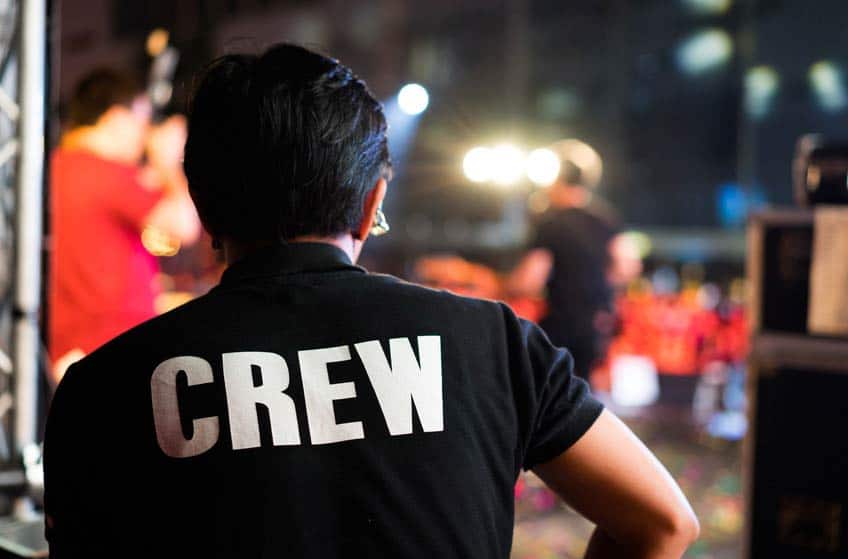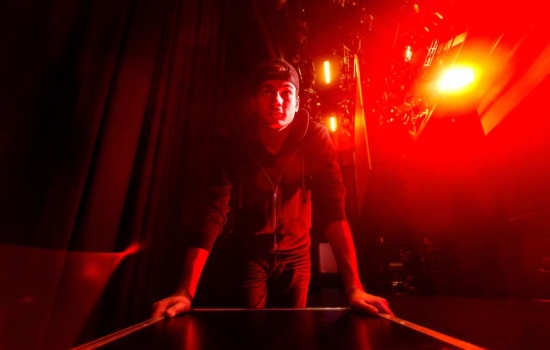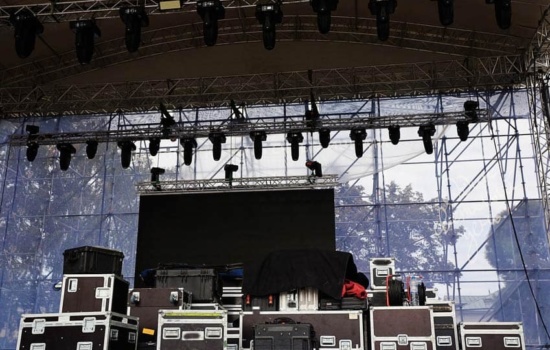Music Career Finder
Start Here:
Roadie
Career Overview
Roadie is the catch-all term for any touring professional in the live music industry. Among other duties, their work may involve engineering sound, programming stage lighting, and tuning guitars.
Alternate Titles
Event Technician, Production Technician, Touring Concert Professional, Stagehand
Avg. Salary
$34,2421
Salary Range
$23K – $51K1

How To Become a Roadie
- A Roadie (AKA Event Technician, Production Technician, or Touring Concert Professional) is someone who helps put on a concert
- As a Roadie, you could be traveling for 9 months of the year, or even as long as 2 years
- Depending on your role, you may have to be knowledgeable about sound or a specific instrument
- Roadies are almost always freelance and set their own rates
- Roadies make an average of about $44,335 annually
- Career Description
- Salary
- Career Outlook
- Career Path
- Experience & Skills
- Education & Training
- Additional Resources
- Sources
- References
Career Description
Roadie is a general term for someone who helps put on a concert.
“Roadie” is not the preferred term for those in this career — they’re called an Event Technician, Production Technician, or Touring Concert Professional.
Furthermore, we need to break down those titles into specific jobs.
Here are the main types of touring concert professionals:
- Technician (specific to each instrument): maintains and repairs instruments, tunes them, plugs them in or sets up microphones, does sound check, sets up and tears down instrument rigs
- Sound Engineer: helps set up sound system, runs sound check, adjusts monitor and in-ear levels, mixes music before and during performance, maintains and fixes sound equipment
- Lighting Engineer: maintains and fixes lighting equipment, sets up and tears down lighting equipment, designs light show that corresponds with performance, tests lighting during sound check
A Day In the Life of a Touring Concert Professional
Obviously, these professionals are traveling most of the time, going from city to city for weeks or months at a time, sleeping on a bus, in a cheap hotel, or at a friend’s house.
It involves long days too. Reynolds said “a rock ’n’ roll day is ten hours.”
According to Reynolds, a typical day could look like this:
- Arrive at the venue
- Load in the backline (the band’s equipment) around 1 or 2 p.m.
- Each professional spends a couple of hours setting up and testing (“line checking”) the equipment according to their assigned responsibilities
- At about 3 p.m., the band/artist does a sound check for about an hour or two
- Next, any opening acts will get a chance to do a sound check
- The venue doors open at about 7 or 7:30 p.m. and everything needs to be ready to go
- In between band performances, there’s the “changeover” where the equipment is swapped for the next performers
- After the show, it’s time to pack up all the equipment and load it into the trucks/vans
Salary
On average, touring concert professionals earn about $44,335 annually. The salary range runs from $43,000 to $60,0001.
“At the top end,” Reynolds said, “chaps who work with Foo Fighters and U2 and all those kind of people will be earning $350, $400 a day, [and] $2,500 to $3,000 a week.”
How Do Roadies Make Money?
Since Road Crew are freelance workers, they determine their own rates.
When it comes to negotiating your rates, Reynolds’ advice is to take your state’s minimum wage, multiply it by 10 hours (a typical day of work), then charge the client that flat fee.
He said you could add an additional $10-20 if you have some sort of degree or training.
Hey, what do you think about trying our new Music Career HelperMusic Career Helper really quick? It’s totally free and could help get your career moving fast! Give it a try. It’s totally free and you have nothing to lose.
Career Outlook
Touring concert professionals are almost always freelance workers.
Only if you work for superstar artists might you see some sort of W-2 employment offered. But everything else is going to be self-employment.
Reynolds said you could end up being on the road for 9 months at a time. And if you work for a band or artist on a campaign to promote a recent album, you could be on the road for two years (with breaks throughout).
Usually, a tour will involve 4-5 shows in a row and then a day off, but that day off is usually travel.
“If you’re not actually playing a show that night then the band doesn’t make any money,” Reynolds said. “Days off cost money, so travel days are usually combined with days off to give singers a rest.”
A typical touring schedule looks like this:
- Summer: festivals (all on weekends)
- January-April / September-December: venue touring
Career Path
Most road crew members start out touring with bands and artists they personally know and who need help on the road.
Others get their start working as stagehands at a live music venue before landing a tour job.
Here’s how you can get your start as a touring concert professional…
Get To Know Bands and Artists
It all starts with networking. Get to know bands and artists who play live a lot and go on tour. You need to find bands and artist and just offer to work with them, usually for free.
Reynolds said you should just say: “Hey, can I tag along? I’ll tune your guitars. I’ll load the truck. I’ll take care of everything. I’ll sell merchandise. That’s the deal. I’ll do it for some beers or whatever.”
Work as a Stagehand at a Venue/Club
By doing a great job as a stagehand (which is basically the same job as a roadie but without traveling and sometimes with a union, like IATSE), you may get noticed by a band that comes through. Then they or their manager may want to hire you for an upcoming tour.
“It’s a definite career path,” Reynolds said. “I know loads of people who’ve done that, just worked as Stagehands and got picked up because they worked really hard and understood the industry they were in.”
Offer To Sell Merch for Bands/Artists
If you don’t want to get into the technical side of being a roadie, you can offer to run the merch table for bands/artists.
And when you’re not running the merch table, volunteer to do anything that would make you “indispensable,” as Reynolds said.
Career Advancement
As for career advancement, there’s not much more to be said.
“…There’s really no career trajectory,” Reynolds said. “You could be working for U2 for one year, then when U2 aren’t touring anymore, it doesn’t really matter. You still need work and you could go back down to working with a baby band again.”
But, he said, there’s nothing wrong with that. Work is work and money is money, and if you love what you do, there’s no reason to complain.
You can’t demand smaller bands pay you ridiculously high fees just because you once worked for a bigger band. You have to be open to taking the work offered to you, especially being self-employed.
Reynolds said it’s difficult to sustain, but “it’s just maximizing the time you’re on the road and making sure you save your money.”
Experience & Skills
Many of the skills you’ll need to succeed, you’ll learn on the job. So you will make mistakes and there will be a learning curve, so you need to have a learner’s mindset.
But to get you started, here are the skills you’ll need to have…
Problem Solver
“Basically you are a communication and problem solver,” Reynolds said.
“You were hired so that things don’t go wrong. Musicians can set up their own equipment; they’re more than capable. But Road Crew are there to make sure things don’t go wrong and if they do go wrong, [to] fix them, and if they can’t figure it out, find out how to fix them.”
Agreeableness
Roadies work long hours and are on the road with the band and other Road Crew members for long periods of time. So an important personality trait is the ability to easily get along with others.
Reynolds said the ideal Road Crew member should be “someone who’s fairly selfless, someone who can adapt easily to different situations, a team player.”
Knowledgable On Your Specification
If you’re a guitar technician, you need to know how to play guitar, how to change strings, and generally how to maintain a guitar.
If you’re a sound technician, you need to be an expert at audio engineering.
If you’re a lighting technician, you have to know how to set up and operate a lighting system.
Whatever specific role you play on tour, you need to have a background in that thing.
Education & Training
Do you need a degree to become a roadie? Well, that depends.
If you’re going to be running the merch table or simply helping load in and pack up equipment, you may not need much of an education background.
But if you’re going to do one of the specialized jobs – like a sound engineer or guitar technician – you will need to have either education or plenty of experience.
“You definitely need some type of sound training or appreciation of sound,” Reynolds said.
“For instance, the bands on stage have their own personal monitor speakers and may have some issues or challenges with what the sound sounds like coming out of those monitor speakers. If you’re trained in sound or have an understanding of sound, you can talk in frequencies, you can talk in musical terms and technical terms. Then you’re going to be able to do a better job. The musician is going to be able to correspond with you better.”
Roadie Degree
If you want to get a bachelor’s degree to help you become a touring concert professional, your best options would be Audio Engineering, Music Production, or Sound Design. These programs will teach you about how sound works and introduce you to a lot of the equipment used on tour.
Gaining Experience
You can also learn what you need to know through experience. You can spend months or years learning the ins and outs of Audio Engineering and Music Production. You can build up a portfolio of projects you’ve worked on that you can then use to get your foot in the door with venues and bands who need stagehands and roadies.
Additional Resources
Reynolds suggests aspiring roadies check out the resources available on his website and through his online course, Five Steps to a Roadie Job.
“There’s lots of good stuff out there. It basically all says the same thing. If you speak to people in the industry who say, ‘You can’t learn it, you just do it,’ that’s true to a certain extent but it’s good to know how a gig works [and] what the typical day is, so you don’t look like a complete numpty.
“There’s a lot of stuff on my site which is designed to help people enter the industry. It doesn’t tell you what to do when you’re a roadie, it tells you how to get there.”
Sources

Andy Reynolds
Andy Reynolds is a veteran concert Tour Manager and touring Audio Engineer. He has worked with some of the biggest names in music, including Whitney Houston, U2, Foo Fighters, Pavement, Nightmares on Wax, Maribou State, Squarepusher, and the White Stripes.
He is the author of several books, including Roadie, Inc: How to Gain and Keep a Career in the Live Music Business, 5 Steps To A Roadie Job: How to Get Working On-The-Road With Touring Bands, and The Tour Book: How To Get Your Music On The Road.
Andy Reynolds has taught live sound engineering and concert management at Academy of Contemporary Music, Point Blank Music School, University of West London/London College of Music, Tileyard Education, Access to Music, Institute of Contemporary Music Performance, Buckinghamshire New University, BIMM, Liverpool University, and City College Manchester.
He has also presented live music business workshops for professional organizations such as the Audio Engineering Society.
References
- 1. "Production Technician Salaries". Glassdoor.com. published: June 6, 2024. retrieved on: Oct 22, 2024





